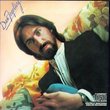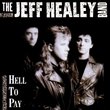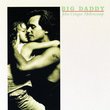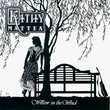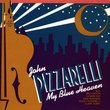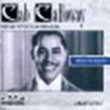| All Artists: Emmanuel Chabrier, John Eliot Gardiner, Wiener Philharmoniker Title: Chabrier: Espana/Suite Pastorale, etc. Members Wishing: 0 Total Copies: 0 Label: Deutsche Grammophon Release Date: 11/19/1996 Genres: Special Interest, Classical Styles: Marches, Opera & Classical Vocal, Forms & Genres, Concertos, Symphonies, Historical Periods, Romantic (c.1820-1910), Instruments, Brass Number of Discs: 1 SwapaCD Credits: 1 UPC: 028944775129 |
Search - Emmanuel Chabrier, John Eliot Gardiner, Wiener Philharmoniker :: Chabrier: Espana/Suite Pastorale, etc.
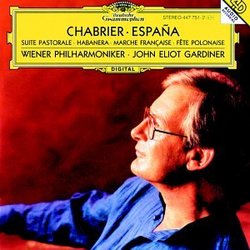 | Emmanuel Chabrier, John Eliot Gardiner, Wiener Philharmoniker Chabrier: Espana/Suite Pastorale, etc. Genres: Special Interest, Classical
|
Larger Image |
CD DetailsSimilarly Requested CDs
|
CD ReviewsLight but enlightening French music Jacques COULARDEAU | OLLIERGUES France | 06/10/2001 (4 out of 5 stars) "Emmanuel Chabrier (1841-1894) is a very fine composer of the nineteenth century. He was born in Ambert, France, a city better-known for its cheeses, among others the Fourme d'Ambert, and its unique round city-hall. He composed many pieces for the good society of that century. So it is light, entertaining, at times slightly country-minded. Some of the pieces on this record are universally known, such as España, though nearly no one knows the composer. The main point of this recording shows an essential element about France. This French composer is directed by an English Director, played by an Austrian orchestra and recorded under a German label. France looks down upon her own artistic production. It is a drama for France today. Our composers, playwrights and artists are better known in foreign countries than in France herself. You will like this light and very expressive music. And you will enjoy this music as a music that is practically never performed in France. Shame on this country that should invest heavily in her heritage and that rejects it massively. Luckily, the English, the Austrians, the Germans and the Americans are saving France's heritage and arts. Enter this delicate world of music and you will be mesmerized by its subtlety and its joyfulness.Dr Jacques COULARDEAU, Paris Universities II and IX." Incredible horn playing danielfurse | Lilburn, GA United States | 01/26/2002 (5 out of 5 stars) "I can't say enough about Chabrier's larghetto for horn and orchestra- it is one of the most thoroughly enjoyable pieces of music in existence. don't be expecting a bunch of fast scales and arpeggios and malarkey, the solo line isn't technically showy at all; but nonetheless this is one of the most evocative and emotionally moving pieces ever written for french horn. listen instead to the purity of Janezic's tone- it is really really incredible, and if you have older speakers the first few bars of unaccompanied horn might even make your mid-range cones clip because the notes are so wondefully resonant.also, a note on the special horns used by the Vienna philharmonic- they are equipped a special type of valve (actually called a "Vienna valve") that is much more acoustically efficient than a standard rotary valve, but these valves are also much more cumbersome to use. this valve design is what gives a Vienna Philharmonic horn its rich vocal quality and variability of character. this exceptional tone in the hands of a player as talented as Janezic gives a result, leaving no hint of the valve's cumbersome nature, that must be heard to be believed- even the pedal tones sound effortless. if you buy this cd, which i highly recommend that you do, you can see a photo of Janezic with his odd-looking horn on the last page of the booklet." Pleasant and light, but Beecham this isn't Santa Fe Listener | Santa Fe, NM USA | 08/25/2006 (3 out of 5 stars) "Chabrier's whipped-cream confections were a staple in the kit bag of Sir Thomas Beecham, and I guess DG decided somewhere along the line that Gardiner was his heir apparent. For a brief while they put the Vienna Phil., no less, at Gardiner's disposal, so there's a guarantee that the recordings would glow. The orchestra plays this mostly unfamiliar music with lovely tone and finesse. The missing ingredient is Beecham's infectious good humor and panache. Nothing goes wrong, but your spirits don't soar, either.
I think the chief value of this CD is to gather so many little gems from Chabrioer's output. You're unlikely to hear any but Espana and the Marche joyeuse on pops concerts, but here they are gleaming bright." |

 Track Listings (11) - Disc #1
Track Listings (11) - Disc #1
